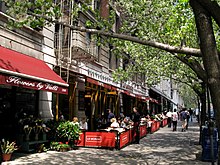Sidewalk cafe
The examples and perspective in this article may not represent a worldwide view of the subject. (September 2019) |


A sidewalk café or pavement café is "a portion of an eating or drinking place, located on a public sidewalk, that provides waiter or waitress service" (as defined by the American Planning Association based upon the New York City planning regulations); the area is used solely for dining.[1] Sidewalk cafés are of two types: enclosed and unenclosed, the former being surrounded by a single-story structure and the latter being an area of the sidewalk that contains removable tables, chairs, and railings.[1]
Sidewalk cafés are common across Europe, forming an important part of street life in countries such as Spain, France and Italy.[2]
New York City
[edit]
New York City regulations control in what areas sidewalk cafés can exist, their construction, and what parts of a sidewalk they can occupy.[3] Proprietors pay a license fee, which is effectively rent paid to the city for the use of the sidewalk.[4]
From 1988 these regulations were a zoning resolution of the New York City Department of City Planning.[3] The 1988 resolution prohibited sidewalk cafés in residential areas and on major thoroughfares, permitting them in malls and (conditionally) "in Historic Districts or in designated Landmark Buildings".[3] The stated purposes are to balance the café proprietors' interests against the needs of pedestrians; to conserve the value of land; and to preserve the characters of neighborhoods.[3]
Until 2003 the process for obtaining a license for a sidewalk café involved so many city agencies and such a long wait time that the law was regularly flouted, with restaurateurs considering it cheaper to just erect sidewalk cafés and pay the fines after the fact.[4] New approval processes were adopted in that year, shortening the process to 140 days and making it the sole responsibility of the city's Department of Consumer Affairs.[4]

The COVID-19 pandemic in New York City forced restaurants to close their dining rooms. They received emergency permission to operate al fresco dining areas in streets. By September 2020, 10,600 restaurants had enrolled in the city's outdoor dining program, compared to just 1,023 sidewalk cafés that existed before the pandemic.[5] Additionally, many restaurants started installing outdoor dining structures called bubble pods to promote social distancing. These semispherical or igloo shaped structures became quite common during the pandemic.[6] While, they've been criticized for not having a proper ventilation system in place and safety concerns, some experts believe that if properly ventilated and cleaned between diners these enclosures could be considered safe.[7]
References
[edit]- ^ a b Dolnick & Davidson 1999, p. 200.
- ^ Hayward, Tim (6 July 2009). "Dining out, out". The Guardian.
- ^ a b c d Gumpert & Drucker 2017, p. 445.
- ^ a b c Berg 2007, p. 30.
- ^ Hu, Winnie; Schweber, Nate (2020-11-09). "The Setups for Outdoor Winter Dining Are Lavish. But Are They Safe?". The New York Times. ISSN 0362-4331. Retrieved 2020-12-04.
- ^ "Restaurant dining bubbles raise covid safety concerns". The Washington Post.
- ^ Corsi, Richard; Specialist, Air Quality; Portl; University, State. "Yurts, Igloos And Pop-Up Domes: How Safe Is 'Outside' Restaurant Dining This Winter?". NPR.org. Retrieved 2021-04-11.
Sources
[edit]- Berg, Bruce F. (2007). New York City Politics: Governing Gotham. Rutgers University Press. ISBN 9780813543895.
- Dolnick, Fay; Davidson, Michael, eds. (1999). "sidewalk café". A Glossary of zoning, development, and planning terms. American Planning Association.
- Gumpert, Gary; Drucker, Susan J. (2017). "Media development and public space: the legislating of social interaction". In Ruben, Brent D. (ed.). Between Communication and Information. Routledge. ISBN 9781351294713.
Further reading
[edit]- Ramati, Raquel. How to Save Your Own Street, Dolphin Books, 1981
- Brown, Carolyn (February 1980). "Sidewalk Cafés". Planning Advisory Service Memos. American Planning Association. pp. 80–2 et seq.
